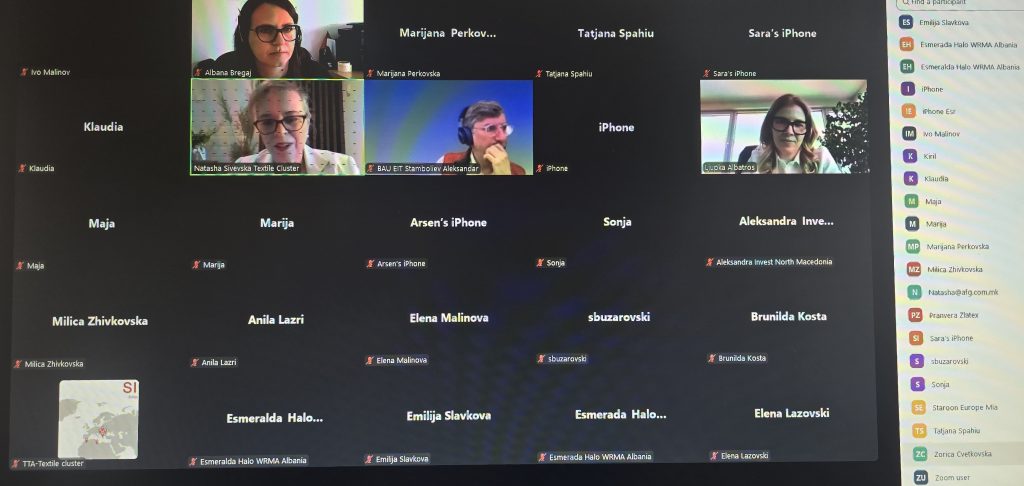Workshop and Matchmaking event titled “Innovating for Sustainability: The Future of the Textile Industry and Textile Waste Management“ held on 16.04.2025 MFW project

On April 16, 2025, stakeholders from across North Macedonia and Albania came together in a dynamic online Workshop and Matchmaking event titled “Innovating for Sustainability: The Future of the Textile Industry and Textile Waste Management “.
The event was organized and hosted by Textile Trade Association – Textile cluster and Milieukontakt Albania. The event brought together universities, SMEs, and industry leaders to explore sustainable solutions, share knowledge, and foster cross-border collaboration in the textile sector.
The session kicked off with opening remarks by Moderator Natasa Sivevska, setting the tone for an insightful day presidents of the two biggest textile associations in Albania and North Macedonia TTA-TC and Pro Export, Ms. Marijana Perkovska, Mr. Edvin Prençe, offered a comprehensive overview of the textile production landscape in both countries, highlighting the environmental impacts and growing challenge of textile waste. In the next panel, Mr. Arsen Mera (Armera Group, Albania) and Ms. Ljupka Miladinova Dzambazovski (Texomak, North Macedonia) discussed current waste management strategies in the textile sector, emphasizing the need for improved regulatory frameworks and producer responsibility.
The MISSION4WATER (M4W) project was then introduced by Ms. Albana Joxhe (Milieukontakt Albania) and Ms. Natasha Sivevska (TTA Textile Cluster) focusing on how the project tackles polyester waste and addresses the threat of microplastics in groundwater. Their presentation underscored the project’s commitment to cleaner production and innovation in waste management. Mr. Aleksandar Stamboliev from BAU Accelerator & EIT Community Officer HUB, shared good European practices, spotlighting successful partnerships between academia and industry for research in textile waste recycling and sustainable manufacturing.
The second session turned toward innovation and prospects. Prof. Tatjana Spahiu (Albania) introduced emerging trends and materials driving the transformation of the textile sector, while Prof. Emilija Slavkova (North Macedonia) presented the rise of digital fashion and its contribution to more
sustainable and customizable production methods. The session continued with presentations on sustainability and circular economic integration. Prof. Maja Gjureska (North Macedonia) explored how circular practices can be embedded into design thinking, and Prof. Albana Leti (Albania) shared strategies to operationalize circular economy principles within local textile industries. A vibrant panel discussion followed, bringing together SME leaders and academic professionals to discuss how stronger cooperation can drive sustainable innovation. The session explored practical steps to develop joint initiatives, boost regional competitiveness, and prepare for green industry transitions.
